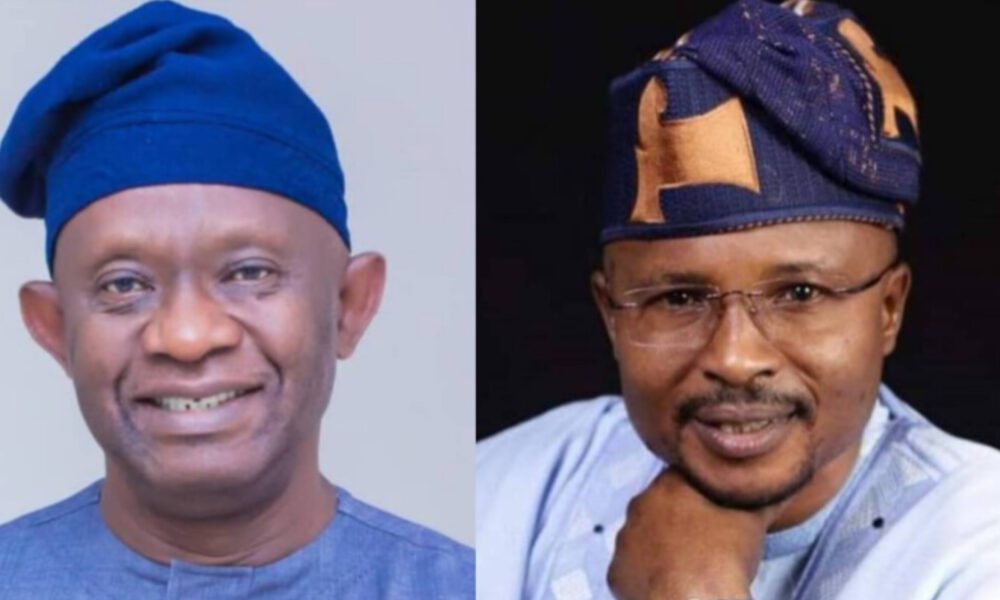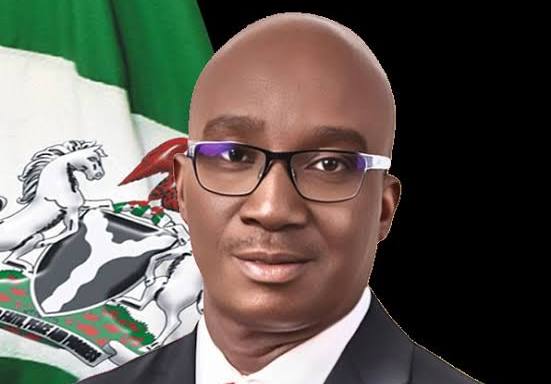By Tunde Olusunle
Perceptive political followers must have been enthralled by the rainbow coloration of representation for the people of Kogi West on one hand, and Okunland, in the ninth session of the national assembly. Between 2019 and 2023, the Senator representing Kogi West at the time was Smart Adeyemi of the All Progressives Congress, (APC). The Lokoja/Kotonkarfe federal constituency had Shaba Ibrahim of the Peoples Democratic Party, (PDP); the Kabba-Bunu/Ijumu constituency represented by Tajudeen Yusuf also of the PDP, while the Yagba federal constituency had Leke Joseph Abejide of the Africa Democratic Congress, (ADC). Kogi State politics hitherto was practically “mono-political,” the PDP being the party to beat. The emergence of the All Progressives Grand Alliance, (APGA), which contested the governorship of Anambra State in 2023, accentuated popular belief that political parties beyond the big ones could contest and win popular votes. Indeed, the multi-party coalition which berthed the APC in 2015 and enabled the party clinch the presidency, reinforced the possibility that aspirants for political office could indeed realise their ambitions outside the bigger, “mainstream” parties.
The 2023 general elections threw up new dynamics in the politics of Kogi West and Okunland. Sunday Karimi who earlier had two stints as representative of the Yagba federal constituency from 2011 to 2015, and from 2015 to 2019, won the senatorial election on the platform of the APC. Abejide got rewarded by his kinsmen for representing them well in his first term and was reelected in 2023. That he remained in the ADC and triumphed even many assumed he would defect to the ruling APC reaffirmed the depth of affection his people have for him. Salman Idris, Fellow of the Nigerian Institute of Architects, (FNIA), the incumbent representative of Kabba-Bunu/Ijumu in the House of Representatives. He adopted the same ADC platform like Abejide for the actualization of his ambition. He has but since followed the APC gravy train.

Legislators, traditionally, have been known to restrict their services, to their specific constitutional catchments. A federal parliamentarian representing Lokoja/Kotonkarfe for instance, concentrates his efforts and advocacy on his specific geopolitical boundaries. TJ Yusuf in his three terms as legislator representing Kabba-Bunu/Ijumu federal constituency from 2011 to 2023, experimented with a pan-Okun approach which aimed at engaging with the five core Okun local government areas, as one bloc. He introduced a regular interactive forum where federal bureaucrats of directorial cadre, Assistant Directors, Deputy Directors and substantive Directors from Okunland converged from time to time to rub minds in the collective interest of the Okun country. Yusuf also cultivated and sustained his affiliations with the entire span of Okunland, regularly identifying with causes beyond his specific area of service.
Okunland has serially received the short end of the stick, regularly overlooked by federal and state authorities in the developmental scheme. From critical infrastructures like roads, to power supply, and more recently insecurity, Okunland has been the butt of deceit and multifaceted afflictions through successive regimes. Beyond their primary responsibilities in law-making therefore, federal congressmen have been compelled to get very involved in providing very basic needs for their constituents. This has often tasked their creativity and private resources, in a milieu of shrinking fiscal wherewithal.
Abejide endeared himself to his folks in the three Yagba local government areas, among other reasons by underwriting the bills for all students in public schools in Yagbaland desiring to write the Senior Secondary School Certificate Examination, (SSSCE), back in 2018. While prioritising his alleged humongous thievery from the common patrimony of the people for which he is standing trial, former governor of Kogi State, Yahaya Bello, wilfully asphyxiated civil servants and other workers of their remunerations and entitlements. He deliberately weaponised poverty among the citizenry and the workforce, exposing the people to tangible gloom and despair. The opacity which characterised the primaries of the bigger political parties also culminated in the hemorrhaging which produced breakouts like Abejide.
Abejide, cognisant of the place of education in the lives of his people read the situation rightly and intervened decisively. He has since expanded the scope of his magnanimity to cover all secondary schools, public and private, across the five primary Okun local government areas. Simply put, education is the major industry in Okunland, an area which has turned out world class intellectuals, professionals and technocrats, in their thousands and Abejide knows this. More contemporaneously, Abejide began a process of mass procurement of resource materials for public and private secondary and tertiary institutions in Okunland. Further to the recent public presentation of two major books by this writer, Abejide procured 150 pairs of the books for distribution to schools across Okunland. The accounting colossus, Otunba Funso Davies Owoyemi it was who pioneered such good naturedness, procuring and distributing Olusunles books across schools in Okunland.
With the decrepit road infrastructure in Okunland earlier alluded to, Abejide has regularly joined forces with like minds to ensure the motorability of roads within Okunland, especially every yuletide season. From the north of Nigeria and Abuja, Okunland is accessible through the Kabba- Ekinrin Adde- Omuo Ekiti, and the Kabba- Aiyetoro-Gbedde- Isanlu- Ejiba roads respectively. Sadly, both accesses are barely motorable at the best of times. Commuters have been known to pass some nights on these roads at the height of rainy seasons which heighten the brokenness of the roads. Abejide is also leading the charge for the development of a dedicated Okun House which will serve as one-stop secretariat for Okun people. As a first timer in the House of Representatives between 2019 and 2023, fate thrust the chairmanship of the House Committee on Customs and Excise, on Abejide. In the 10th Assembly which is in session, Abejide has been retained in the same position, a placement which has enabled him to support his people in instances.
Sunday Karimi came into office as Senator representing Kogi West District, armed with requisite experience as a “ranking parliamentarian.” While he previously covered just the three local government areas in Yagbaland, his present responsibility spans seven expansive local governments, traversing three federal constituencies. That Karimi was promptly assigned to chair the Senate Committee on Services by the President of the Senate, Godswill Akpabio, is evidence that he can be trusted to deliver. He has been proactive since he was inaugurated alongside his colleagues in June 2023.
Karimi commanded attention earlier this year when he initiated and singlehandedly undertook to build a military “Foreward Operating Base,” (FOB) in Egbe, Kogi State, at the intersection of Kogi and Kwara states. Karimi had been personally traumatised by the sudden desecration of the pristine calm and quiet of Okunland, by a motley of undesirable elements. Thoughtless Fulani herdsmen; brazen armed robbers and daring kidnappers, have suddenly upset the acclaimed serenity of Okunland. Karimi’s all encompassing “mini barracks” is complete with accommodation facilities; administrative offices; an observatory; recreation installations; water supply and so on. He equally provided trucks for the mobility of the occupants. The facility was taken over last October by the Nigerian Army which has since deployed personnel. Leke Abejide attended the event to support Karimi, as evidence of the rapprochement between both legislators.
Karimi who inaugurated a N100m bursary scheme for students of tertiary institutions from Kogi West last July, has committed another N100million to the empowerment of women in Kogi West, through cooperative societies. He moved swiftly last October to personally fund the restoration of the dismembered Pakuta bridge connecting communities in Ijumu, Bunu district and Lokoja local government areas, at about N20m. Setraco Construction Ltd was originally awarded their contract to build the whole stretch of the road and related infrastructures. Inadequate funding has, however, impacted the realisation of the project. Karimi is also building a 1000 capacity multipurpose hall at the National Open University of Nigeria, (NOUN) Study Centre in Isanlu. Karimi is anchoring the holistic upgrading of the Government Secondary School, Kotonkarfe, into an ultramodern institution, in collaboration with the Federal Ministry of Education, which will cost over one billion naira. Karimi has also launched an ambitious N1.24 Billion project, to rehabilitate and build 140 solar-powered boreholes across Kogi West, across the 85 electoral wards in KogiWest. Back in September, Sokoto State Governor, Ahmad Aliyu-Sokoto, announced his administration had committed N1.2Billion on building 25 new boreholes! Karimi’s constituents must feel immensely proud about the frugal effectiveness of their representative. The first two boreholes under the “140 boreholes initiative,” have been drilled in Aherin community in Lokoja local government area.
Karimi, in addition to these laudable strides, has been financially supportive of the Anglican Church School of Nursing Project being developed in Iyara. The initiative is being pursued in collaboration with Scotland-based organisation. Ever conscious of the thirst of his people for educational and professional literacy, Karimi maintains close oversight on this initiative. Smart Adeyemi and Dino Melaye, Karimi’s predecessors in the Senate, broached the advocacy for the upgrade of the Federal College of Agriculture in Kabba, which is affiliated to the Ahmadu Bello University, (ABU), Zaria, into a full-fledged university, while in office. The aim is to provide additional opportunities for university education for restless questers from Kogi West and beyond. Karimi has continued on the same path, ever drawing the attention of the Senate to the imperative of this popular desire by his people.
Karimi and Abejide are amongst the most experienced parliamentarians from Kogi State in the federal congress, on current form. The hitherto discontinued meetings of the Kogi West Caucus in the national assembly, has been reactivated. This engenders interface between congressmen with the overall aim of providing better representation for the people. They have also opened up themselves to regular interactions with their constituents as may be requested for, and scheduled. Karimi and Abejide hosted representatives of the Yagba Action Group in their Abuja homes, within one week of each other, in August and September this year for instance. Both men are also on the same page on ensuring the rehabilitation of the Kabba-Aiyetoro-Gbedde-Mopamuro-Isanlu-Egbe road, a critical artery connecting almost all the local government areas in the zone.
Confronting the reality that governmental budgetary provisions may never scratch the surface of the road, Karimi and Abejide continue to collectively engage the Federal Ministry of Works, and the leadership of Mangal Cement Industries which recently became operational in Iluhagba Gbedde, in Ijumu area. Sections of the Kabba to Egbe road are being patched up for motorability as we speak, arising from the persistence of both gentlemen. It is the same unanimity of purpose which informs the concern of both public servants about the need for the operationalisation of Omi Dam, a facility in Yagba West, built decades ago, yet un-utilised. The dam can be developed for hydro- electricity and for irrigation purposes to ensure all-year farming in Kogi West. The journal towards tangibly impacting their constituencies and homelands may still be long. It seems evident, however, that Karimi and Abejide have their bootstraps firmly fastened, eyes trained on the tracks of the marathon.
Tunde Olusunle, PhD, Fellow of the Association of Nigerian Authors, (FANA), is an Adjunct Professor of Creative Writing at the University of Abuja




